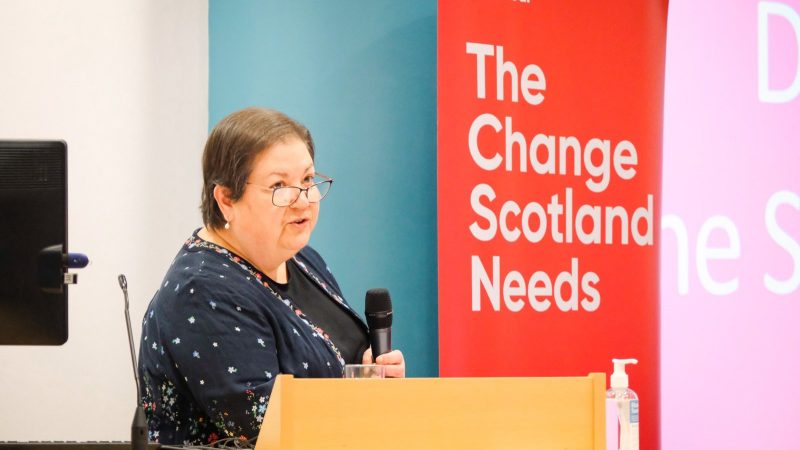
A Scottish Labour candidate has warned supporters many constituencies the party needs to win to secure a majority of Scottish seats are on an “absolute knife-edge”, despite the party’s by-election wins and poll progress.
Speaking at the 2024 Scottish Labour Party conference in Glasgow on Friday, Martin McCluskey said one recent poll suggested as few as 26,000 votes – spread across 14 seats – could double Scottish Labour’s parliamentary haul at a general election.
McCluskey, prospective parliamentary candidate for Inverclyde and Renfrewshire and chair of the Scottish Fabians think tank, said while the latest English by-election breakthroughs had been “brilliant”, Scotland had a “very different context”.
Meanwhile deputy Scottish Labour leader Jackie Baillie urged activists at the same event to “knock your pants out” to give the country the change it is crying out for, as “nobody else is going to deliver it”.
She admitted last year she “wasn’t convinced” the party’s then six official target seats were even target seats, whereas now “we’ve many, many more” target seats.
Just 26,000 votes could double Labour’s MP haul
But at the Scottish Fabians fringe event, McCluskey warned: “Our biggest enemy over the next nine months, if it is that long, is complacency.We are on an upward trajectory but we still need to do a lot of work.”
🌹 As we head into a crucial election year, we hear from @jackiebmsp, @PFOKane, @martinmccluskey and @tracygilbert72 on what Labour needs to do in Scotland to win support and make the transformative change that only a Labour Government can bring. pic.twitter.com/QTgRQumJa0
— Scottish Fabians (@ScottishFabians) February 16, 2024
He said a new poll by Electoral Calculus this week was “really instructive”. It predicted Labour would win 14 seats in Scotland – and in eight of them, only with majorities of less than 4%.
“That’s us talking about hundreds, maybe the low thousands – tiny majorities.”
In another 14 seats which Labour would need to win to secure a majority of Scottish seats (28), the majority Labour needs to overturn also averages 4%, he added.
“We’re talking about tiny margins here; these seats are on an absolute knife-edge. The difference in the number of votes between 14 and 28, those 14 additional seats, is 26,000.”
‘We need a sustainable majority’
He urged supporters: “Do not wake up the morning after the election and think that just a little more work might have got you over the line.”
Adding just 100 votes “can be turned round by activists now [and] it can be turned round by activists on polling day”.
“Remember, lots of work at this point will pay dividends further down the line, because there are so many undecided voters. They need to have persuasive conversations on the doorstep.”
McCluskey also argued marginal victories were not sufficient. “We shouldn’t be just trying to win by one vote, or by 10 votes or by 100 votes, we should be trying to make these sustainable majorities not just for one term but for two terms.”
“Because the type of change we’re proposing through things like the Green Prosperity Plan, these are not one-term projects, these are two-term projects, so we should be going out to establish sustainable Labour majorities.”
Read more of LabourList’s Scottish Labour party conference 2024 coverage from our editor in Glasgow:
- Watch and read Keir Starmer Scottish Labour speech: ‘The power to build a new Scotland is in your hands’
- Scottish Labour Conference 2024: Sarwar speech key highlights
- Scottish Labour target seats on ‘absolute knife-edge’ despite by-election triumphs
- Ian Murray: ‘We all want same thing’ as ceasefire march hits Labour conference
- Scottish Labour conference vote and protest for Gaza ceasefire heap pressure on MPs
- Anas Sarwar writes: ‘A seismic shift is underway – Scots won’t settle for the status quo’




More from LabourList
‘Council Tax shouldn’t punish those who have the least or those we owe the most’
Two-thirds of Labour members say government has made too many policy U-turns, poll reveals
‘Two states, one future: five steps on the path to peace for Israelis and Palestinians’